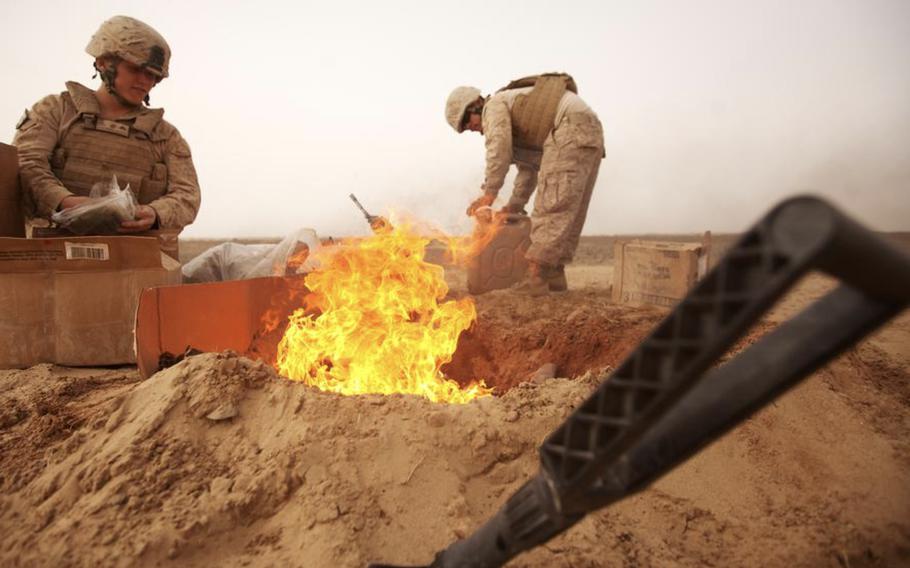
In this 2012 photo, Lance Cpl. Nathanial Fink, left, and Lance Cpl. Garrett Camacho burn trash in Afghanistan. The military used the open-air pits to dispose of unwanted items, including chemicals, human waste, medical items and food leftovers. (Alfred V. Lopez/Marine Corps)
WASHINGTON — More than 400,000 veterans signed up for health care with the Department of Veterans Affairs in the past year — a 30% increase from the prior year — with higher enrollments driven by a new law covering illnesses from toxic exposure during military service.
The year-over-year increase spanned every state, with Texas topping the list with approximately 41,200 new enrollees, followed by California at 33,500, Florida with 33,000, Virginia with 20,500, and North Carolina at 17,500, the VA said.
Approximately 93,000 more veterans have signed up for VA health care compared to last year, when enrollment topped 307,000. VA provides free and low-cost health care for qualifying veterans.
“Veterans who come to VA are proven to have better health outcomes and pay less than veterans who don’t,” VA Secretary Denis McDonough said Friday, when the enrollment numbers were announced.
The VA said these are the most new enrollees since 2016 and represent a 50% increase from signups for VA health care during the coronavirus pandemic in 2020, the VA said.
The higher numbers are the result of health coverage and disability compensation granted to eligible veterans under the Sergeant First Class Heath Robinson Honoring our Promise to Address Comprehensive Toxics Act, known as the PACT Act, which became law nearly two years ago.
In fiscal 2025, the VA is proposing to spend $25 billion for the Toxic Exposures Fund to pay for health services and disability benefits for veterans with toxic exposures. The amount is about $5 billion more than the 2024 request, and represents about 10% of all mandated spending at the VA.
Under the PACT Act, veterans exposed to hazardous substances during active duty can enroll in VA health care and qualify for monthly disability compensation for medical conditions connected to their exposure to environmental hazards from military duty.
The list of identified environmental hazards includes burn pits, radiation, Agent Orange, and firefighting foams, among other toxins.
The VA pointed to the experience of Adam Coyle, a former Army staff sergeant whose military career was cut short in 2016, after he developed severe asthma from deployments to Iraq and Afghanistan, where he came in close contact to burn pits and other airborne hazards.
Coyle, who served for nine years, now oversees veteran outreach activities for the Providence VA regional office in Rhode Island.
“My asthma is still bad and requires me to use an inhaler several times a day,” he said.
Since the PACT Act was signed into law in August 2022, more than 860,000 claims for coverage have been approved, the VA said. The approval rating for claims is 75%. Veterans most frequently file medical claims for hypertensive vascular disease, rhinitis (similar to a chronic cold), asthma and chronic bronchitis, which are presumed to have resulted from toxic exposure during military service.
The VA announced in March that it is waiving a requirement for veterans to first have an approved claim for a toxic exposure-related medical condition to qualify for VA health care.
The open enrollment applies to veterans from the Vietnam War, Gulf War, conflicts in Iraq and Afghanistan, the Global War on Terrorism or any other combat zone after 9/11, the VA said.
Veterans who never deployed but were exposed to toxins or hazards while training or on active duty in the U.S. also are eligible to enroll.
To be eligible for VA health care benefits, veterans must meet basic service and discharge requirements. Veterans with a discharge that is dishonorable, other than honorable or from bad conduct might not qualify.
Veterans can apply for a discharge upgrade, if they can show their discharge was related to a medical condition, traumatic brain injury, sexual orientation, sexual assault or sexual harassment, according to the VA.